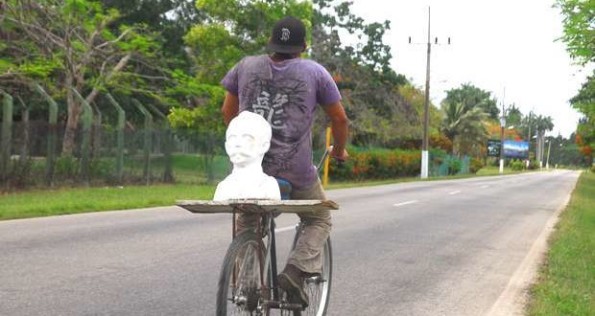Ivan Garcia, 9 August, 2015 — Although the official narrative is still full of tiresome rhetoric about a prosperous and sustainable socialism and General Raul Castro often repeats the slogan “Cuba is a revolution of the humble for the humble,” real life is following another path.
While kingpins and warlords in epaulets do linguistic somersaults in an attempt to promote a society supposedly created for the people, those who work for the state are the ones whose lives are hard.
The man or woman on the street sees it all as ancient history: the long speeches by Fidel Castro, the pugilistic rhetoric of ten US administrations, the heroic and frightening language, the improvisation and an economy based on rationing.
In conversations with family and friends, Cubans are often harsh in the judgments of fifty-six years of Castro rule. But fear of raising one’s voice and demanding restoration of civil rights still persists. The average citizen does not have what it takes to be a martyr. Becoming part of the dissident community is not seen as an option. Nor is joining the Communist Party.
The era when many of them believed the assurances of Fidel Castro — so many lies, so many dashed hopes — who promised more affluence than New York and more milk and cheese than Holland, is over.
Caribbean socialism, or what was promoted under that name, elicits forced smiles from the average person.
’What socialism?” asks Sergio, a professional who does not consider himself an opponent of the regime. “The one that offers internet access for a third of the average wage? Or which requires you to work for ten lives just to buy a car? Is this paradise, where your wages don’t provide you enough to eat or allow you to stay at a hotel in Varadero? A country where people cannot choose their leaders or get foreign television channels or buy the books they want? The Revolution is a hoax. The saddest thing is that we have squandered our best years supporting it.”
Raul Castro has buried Communist voluntarism and other follies of his brother Fidel a hundred meters underground. He has opted for tepid reforms that have sparked more enthusiasm among foreign businessmen and politicians than among Cubans.
People no longer trust their elderly leaders, who speak of social justice and equality but who live extravagantly. They remain unaccountable and manage public money as though they were casino owners.
Cubans are fed up. With broken promises, with idyllic visions and with a prosperity which never comes. After each pipe-dream fails, the setback is even greater.
Governmental reluctance and a phobia of democracy have led to cosmetic, tightly controlled reforms which — marked by excessive taxation and an absence of wholesale markets — have hindered small business.
For Cuba’s autocratic leadership being rich is a crime, though not for those in its small inner circle. Nine years after Fidel Castro personally transferred power to Raul, there have been some changes and some things have even gotten a little better.
But you get the feeling that Raul’s reforms have only gone halfway. They approach the swamp but do not cross it. They are spurious, reticent transformations that do not benefit most people.
While these changes and others were necessary, they have fallen short in their application. Pessimism among Cubans is rampant. No one expects miracles from the government of Raul Castro.
Things continue to worsen. The smoke signals and rhetoric of change are intended for a foreign audience. Islands of investment are off limits to Cubans, whose only contribution — even in best-case scenarios — is their cheap labor.
There is no yardstick to measure the ideology of power in Cuba. It is not Marxism. The state levies incredible fees on private workers like a mafia chieftain.
Property belongs to the people only in textbooks. The profits of state businesses are obscene. Worker exploitation in the form of poverty-level wages is a sign of an avaricious capitalism in its infancy.
The regime slows and hinders the expansion of universal internet access at affordable prices. Almost everything is a fraud. An opportunity to earn hard currency does not translate into a better quality of life.
What the island has is a form of state capitalism run by family members and military officials, who alone control 80% of profitable businesses. Reforms and legislation that encourage foreign investment are intended to benefit this group.
In republican Cuba, during the administration of José Miguel Gómez (1909-1913), there was a popular saying: “When the shark swims, he splashes.” (Meaning: When the president steals, he provides opportunities).
The Castro brothers, not so much.
Ivan Garcia

